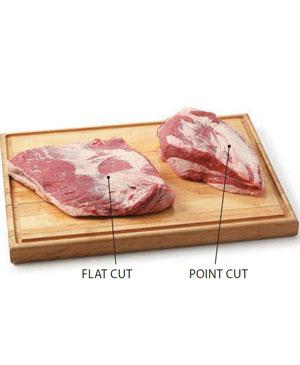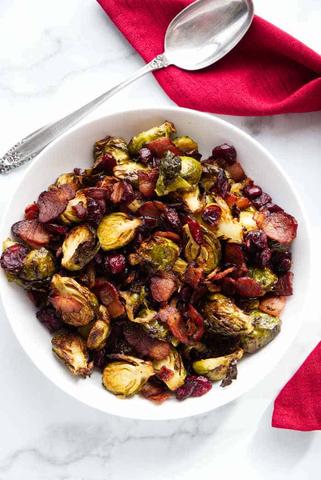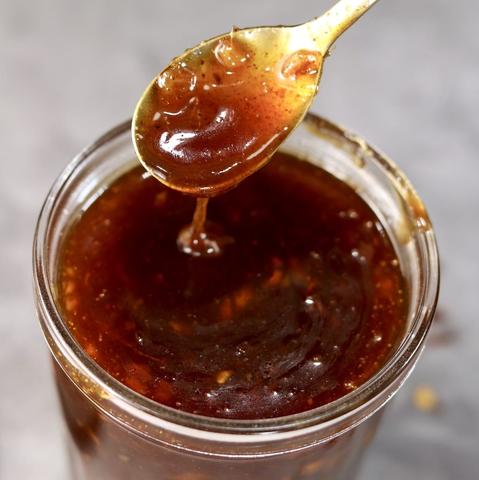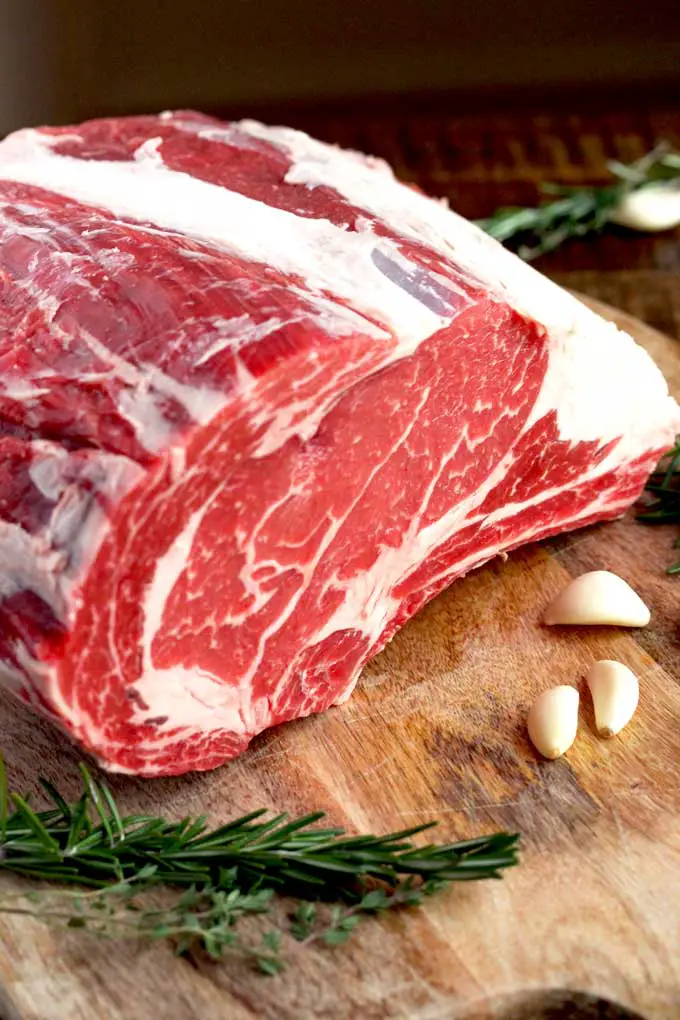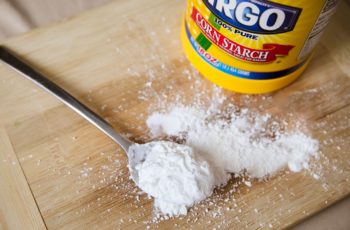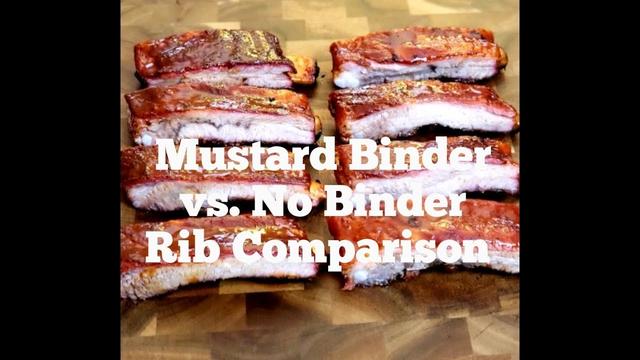
“Mustard: The Versatile Binder! Discover the secret ingredient that adds a punch of flavor and holds your dishes together. From tangy dressings to savory marinades, mustard serves as a versatile binder that enhances taste and texture. Unleash your culinary creativity with this essential kitchen staple!”
Mustard on Ribs: Why is it Used?

Opinions on whether or not to use a mustard coat before a dry rub layer on ribs are mixed. Some people believe it’s an important part of the process, while others think it serves little to no purpose. The reason people use mustard on ribs is to help the dry rub stick better to the meat. Mustard acts as a binder, schmear, or slather, essentially acting as a glue for the dry rub and the meat. During the smoking process, the liquid components of the mustard vaporize, so it imparts no flavor that can be tasted.
The conversation about binders in barbecue has been ongoing for a long time, but there isn’t a clear understanding of why mustard is specifically used. One possible reason is that most commercial mustards are vinegar-based and readily accessible in most households’ refrigerators. Mustard is also cheaper compared to other options like olive oil. When mustard is cooked or smoked, the liquid ingredients evaporate, leaving behind mustard powder, salt, turmeric, paprika, garlic powder, and other spices commonly found in barbecue rubs.
If your goal is to impart a mustard flavor to your ribs, using mustard as a binder won’t achieve that since the amount of mustard seed or ground mustard left after cooking isn’t enough to be tasted. Nevertheless, many people still prefer using mustard as a binder because it’s inexpensive and easily available.
Why Mustard?
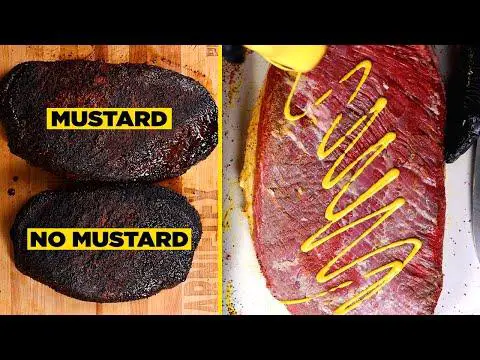
Opinions on whether or not to use a mustard coat before a dry rub layer in barbecue are mixed. Some people believe it’s an important part of the process, while others think it serves little to no purpose. The reason people use mustard on ribs is so that the dry rub sticks better to the meat. Mustard acts as a binder, acting like glue for the dry rub and the meat. During the smoking process, the liquid components of the mustard vaporize, meaning it imparts no flavor that can be tasted.
Mustard is commonly used as a binder because it’s primarily vinegar-based, readily accessible in most households’ refrigerators, and inexpensive. Most commercial mustards are made from crushed mustard seeds, water, vinegar, and white wine. When mustard is cooked or smoked, the liquid ingredients evaporate and leave behind mustard powder, salt, turmeric, paprika, garlic powder, which are commonly used in barbecue rubs. However, the amount of “mustard seed” or “ground mustard” left after cooking isn’t enough to impart a noticeable mustard flavor.
Commercial Mustard Ingredients
– Crushed mustard seeds
– Water
– Vinegar
– White wine
Availability and Cost
Mustard is a widely available condiment that can be found in most households. It is commonly used in backyard cook-outs for foods like hamburgers and hotdogs. Mustard is readily accessible in most people’s refrigerators and is also relatively cheap compared to other binders like olive oil. Popular brands of mustard, such as French’s Yellow Mustard and Heinz Yellow Mustard, can be purchased for under $2 for a bottle.
Other alternatives to mustard as a binder include cooking oils like vegetable oil, avocado oil, canola oil, and olive oil. While these oils are more expensive than mustard, they are commonly found in most households and can be used as an alternative binder for barbecue recipes. Apple cider vinegar/apple juice, pickle juice, hot sauce, and mayonnaise are also commonly used as binders and are relatively inexpensive options.
Ultimately, the choice of binder comes down to personal preference and availability. Mustard remains the most popular option due to its affordability and widespread availability in households. However, experimenting with different binders can help determine which one works best for individual taste preferences.
Alternatives to Mustard

Water: Using water as a binder can help rehydrate the dry rub and allow it to penetrate the meat. While it may not add any additional flavor, it is a simple and accessible option for those who do not have mustard on hand.
Worcestershire Sauce: Although more commonly used for beef cuts like brisket, some pitmasters use Worcestershire sauce as a binder for pork ribs. The vinegar and water in the sauce evaporate during cooking, leaving behind spicy notes from chili pepper extract and sweetness from sugar and molasses.
Pickle Juice: Some barbecue enthusiasts combine pickle juice with mustard to create a slather or binder. This is often seen in barbecue joints where leftover pickle brine is repurposed. The brine contains small quantities of sea salt, turmeric, and natural flavors that are cooked off during the smoking process.
Cooking Oil: Any form of cooking oil can be used as an alternative binder, such as vegetable oil, avocado oil, or canola oil. These oils are readily available in most households and can serve the purpose of helping the dry rub stick to the meat.
Apple Cider Vinegar/Apple Juice: Apple cider vinegar or apple juice are commonly used with pork cuts like ribs. They can be used both as a liquid wrap during cooking and as a binder for the dry rub.
Hot Sauce: Hot sauce can also act as a binder for dry rubs. Most hot sauce brands are relatively inexpensive, and they add spicy notes from cayenne peppers to the meat.
Mayonnaise: Mayonnaise is another neutral option that can be used as a binder. It is commonly used by some pitmasters and comes in various variations, such as chipotle-flavored mayo.
Water and/or No-Binder?
Water and/or No-Binder?
Using water as a binder is a common alternative to mustard in barbecue. Water helps to rehydrate the dry rub and allows it to penetrate the meat. While dry-brining can achieve similar results, it requires a longer wait time. The process of dry-brining involves adding salt to the meat, which draws out the meat’s juices and creates a concentrated brine. This brine solution then gets reabsorbed by the meat, resulting in tender and flavorful barbecue.
However, not everyone has access to clean tap water or may prefer not to use water as a binder. In such cases, using no-binder is also an option. Many pitmasters apply their dry rub directly onto the meat without any binding agent. They rely on the natural moisture of the meat and the heat from smoking to help the rub adhere to the surface.
Ultimately, whether you choose to use water as a binder or go with no-binder is a matter of personal preference and experimentation. Barbecue allows for creativity and trying different methods to find what works best for you.
WorcestershireSauce
Worcestershire sauce is another common binder option used in barbecue. While it is not as widely used as mustard, some Pitmasters prefer to use Worcestershire sauce as a binder for pork ribs. It contains ingredients that are commonly found in barbecue rubs such as vinegar, water, sugar, molasses, and chili pepper extract. When the liquid components of Worcestershire sauce evaporate during the smoking process, you are left with spicy notes from the chili pepper extract and sweet flavors from the sugar and molasses. However, the remaining quantities of these ingredients are not enough to impart significant spiciness or sweetness to the meat.
Note: Many Pitmasters also use Worcestershire sauce as a binder for beef cuts like brisket, rib roasts, chuck roasts, and beef ribs because it enhances the beef flavor.
Pickle Juice and Mustard
Pickle juice and mustard are sometimes combined to create a slather or binder for barbecue meats. Pickle juice, which is the brine from jars of pickles, is often left unused in barbecue joints. By combining pickle juice with mustard, it serves as a cheap and accessible alternative to other binders like olive oil. When these two ingredients are combined, their liquid components vaporize during the smoking process, leaving behind only small quantities of salt, turmeric, and other flavors that cannot be tasted.
Mayonnaise is another commonly used binder in barbecue. It is a neutral option that can help dry rubs stick to meat effectively. While there are variations of mayonnaise available with additional ingredients like chipotle for added flavor, the main purpose of using mayonnaise as a binder is not for taste but for its binding properties.
Olive oil is a popular cooking oil that can also be used as a binder in barbecue. However, it tends to be more expensive compared to other options like mustard or vegetable oil. While some people prefer using olive oil due to its flavor and quality, others opt for more affordable alternatives.
Various types of cooking oils like vegetable oil, avocado oil, and canola oil can also be used as binders in barbecue. These oils serve the same purpose of helping dry rubs adhere to meat but do not impart any significant flavor during the smoking process.
The choice of binder in barbecue is largely based on personal preference and availability. Some Pitmasters prefer using mustard or no binder at all, while others explore alternatives like pickle juice or mayonnaise. Ultimately, the goal is to find a binder that helps enhance the flavor and texture of the barbecue meat.
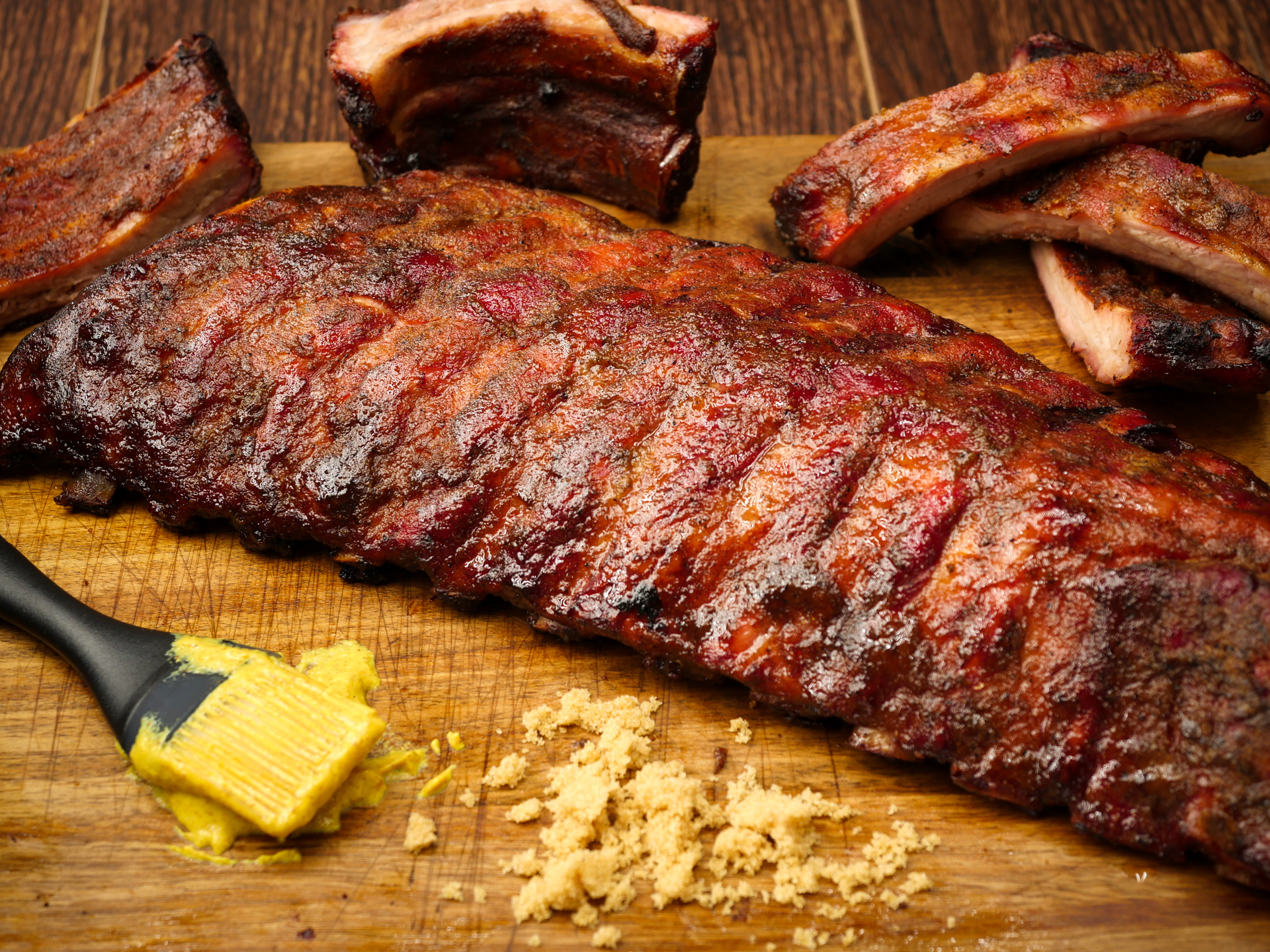
Cooking Oils: Olive Oil, Canola Oil, Vegetable Oil, etc.
Opinions on whether or not to use a mustard coat before a dry rub layer are mixed when it comes to barbecue. Some people believe it’s an important part of the process, while others think it serves little to no purpose. The reason people use mustard on ribs is to make the dry rub stick better to the meat. Mustard acts as a binder or glue for the dry rub and the meat. During the smoking process, the liquid components of the mustard vaporize, so it doesn’t impart any flavor that can be tasted. The conversation about binders in barbecue has been ongoing for a long time, but there isn’t a clear understanding as to why mustard is used. It’s likely because mustard is primarily vinegar-based (depending on brand), readily accessible in most refrigerators, and cheap.
Mustard is commonly used as a condiment in backyard cook-outs for food like hamburgers and hot dogs. If you believe in using a binder, mustard is a cheap alternative to something like olive oil. While some Pitmasters opt for alternatives such as Worcestershire sauce or pickle juice, many find mustard to be the cheapest option and their preference for certain cuts of meat like pork butt. Other alternatives include water to re-hydrate the rub and allow it to penetrate the meat or using apple cider vinegar/apple juice, cooking oil (such as vegetable oil), hot sauce, or even mayonnaise as binders. Each option has its own advantages and flavors that can complement different types of barbecue meats.
Apple Cider Vinegar/Apple Juice
Apple cider vinegar and apple juice are commonly used as binders in barbecue, especially for pork cuts like ribs. The sweet and tangy flavor of apples complements the pork well. Many people use apple juice when performing a Texas crutch, where the ribs are wrapped in foil with liquid to help tenderize them. This means that you may already have apple juice on hand to use as a binder. Additionally, a mixture of water and apple cider vinegar is often spritzed onto the meat throughout the cooking process to create a better bark. Apple cider vinegar and apple juice add moisture and flavor to the meat, helping the dry rub stick better.
Overall, using apple cider vinegar or apple juice as a binder adds a subtle fruity flavor to your barbecue without overpowering the taste of the meat. It’s a popular choice among barbecue enthusiasts, especially for pork ribs.
Hot Sauce
Hot sauce is a popular option as a binder for barbecue. It is relatively inexpensive and widely available. One common brand is Frank’s Red Hot, which contains distilled vinegar, water, cayenne peppers, salt, and garlic powder among other ingredients. When used as a binder, the liquid components of the hot sauce vaporize during the cooking process, leaving behind spicy notes from the cayenne peppers. While some people may perceive a slight spiciness from the hot sauce, it is not typically a dominant flavor in the final barbecue product.
Another potential advantage of using hot sauce as a binder is that it adds some additional moisture to the meat. The vinegar and water components can help to keep the meat moist during smoking or grilling. Additionally, the tangy flavor profile of hot sauce can complement certain types of meat, such as chicken or pork.
Overall, hot sauce serves as an effective binder for dry rubs in barbecue cooking. It helps the rub adhere to the meat and adds a subtle tangy flavor without overpowering other flavors in the dish.
Mayonnaise
Mayonnaise is another common binder used in barbecue. It is a fairly neutral option and can help the dry rub stick to the meat. Hellmann’s is a popular brand of mayonnaise that is often used. Mayonnaise contains ingredients such as soybean oil, water, whole eggs, vinegar, salt, sugar, and lemon juice concentrate. When cooked or smoked, the liquid components of mayonnaise evaporate, leaving behind the remaining ingredients such as oil, eggs, and seasonings. Mayonnaise does not impart a strong flavor to the meat when used as a binder in barbecue.
Mustard Applied After the Dry Rub?
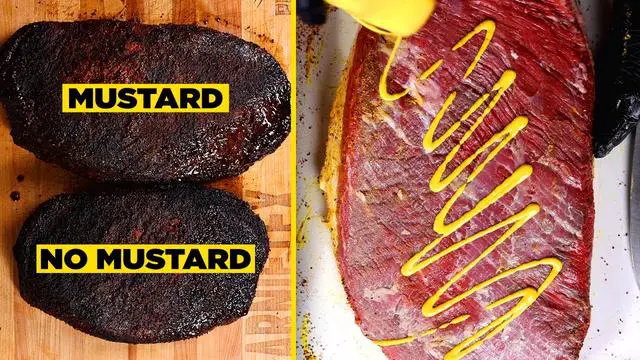
Some Pitmasters, like Melissa Cookston of Memphis BBQ Co., choose to apply mustard after they have dry rubbed their ribs. The purpose of this is still to act as a binder, allowing the dry rub to stick better to the meat. Melissa applies her rib rub first, then adds a layer of mustard, and finishes with a sprinkling of turbinado sugar. The large granules of sugar can have difficulty sticking to the surface of the meat, but the mustard helps with this adhesion.
It’s important to note that applying mustard after the dry rub does not significantly alter the flavor of the final dish. Like when applied before, the liquid components of the mustard vaporize during cooking, leaving behind only trace amounts of mustard powder and other seasonings from the dry rub. Ultimately, whether you choose to apply mustard before or after the dry rub is a matter of personal preference and experimentation.
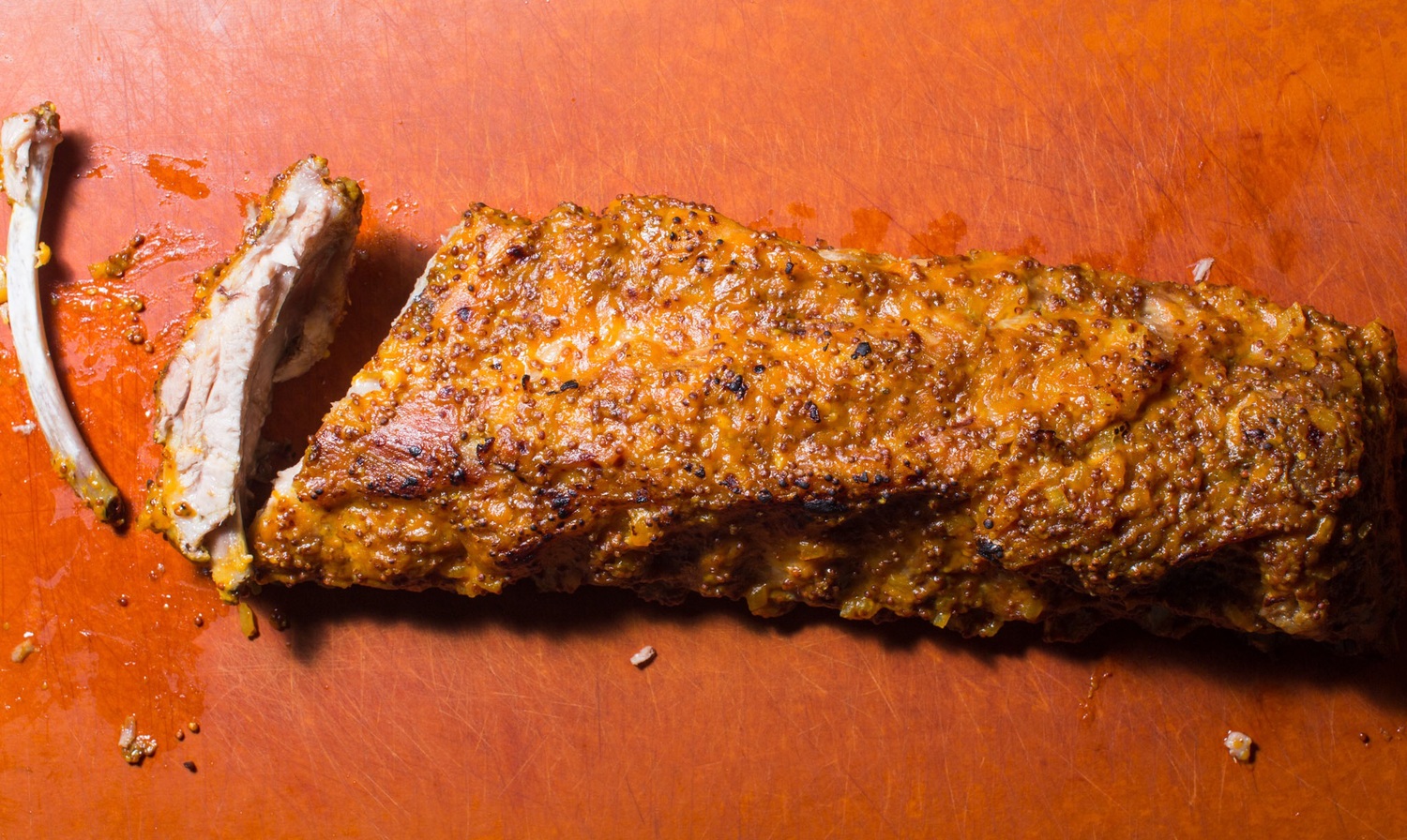
Final Thoughts
The use of mustard as a binder in barbecue is a topic of debate among pitmasters. While some believe it is essential for helping the dry rub stick to the meat, others argue that it serves little purpose. Mustard does not impart any noticeable flavor when cooked, as the liquid components vaporize during the smoking process. Many people choose mustard as a binder because it is vinegar-based, readily available, and inexpensive.
There are alternatives to mustard as a binder, such as water, Worcestershire sauce, pickle juice, cooking oils (like olive oil or vegetable oil), apple cider vinegar/juice, hot sauce, and mayonnaise. These options can also help bind the dry rub to the meat and provide different flavors. Experimentation with different binders can help you find your preferred method.
In conclusion, while mustard is a popular choice for a binder in barbecue due to its availability and affordability, there are other options available. The choice of binder ultimately depends on personal preference and desired flavors in your barbecued meats.
In summary, mustard can serve as a versatile and flavorful binder in various culinary applications. Its natural emulsifying properties make it an excellent choice for enhancing the texture and taste of dressings, marinades, and sauces. Additionally, mustard’s ability to complement a wide range of ingredients makes it an indispensable ingredient in both traditional and innovative recipes. By incorporating mustard as a binder, chefs and home cooks can elevate their dishes with a tangy kick that adds depth and complexity to their creations.
Learn More About Grilling
If you want to learn more about grilling, check out these other helpful resources!

